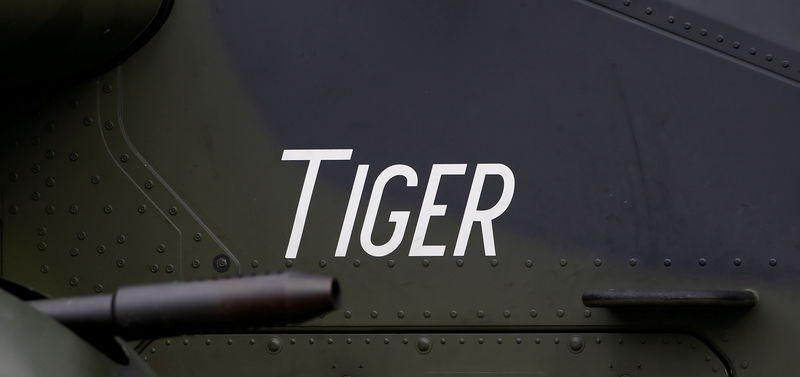By Andrea Shalal
BERLIN (Reuters) - Germany's defence ministry on Thursday defended the performance of its Tiger helicopters as part of a U.N. peacekeeping mission in Mali amid indications that Wednesday's deadly crash of one of the aircraft was due to technical factors.
Two crew members were killed when one of Germany's four Tiger helicopters crashed in the West African nation's desert north on Wednesday, but there were no signs that it was downed by an attack, German officials said. [nL5N1KH6H9]
It was the first deadly accident involving Germany's Tiger helicopters. Two crew members escaped with minor injuries during an earlier crash in 2013 during a training flight in Bavaria. There was no indication that the two crashes were related.
The Tiger helicopters, which first began flying in Mali earlier this year, required extra maintenance given the high heat and other environmental conditions, but had been completing all tasks required by the United Nations, a ministry spokesman said. He said the helicopters had been performing well.
A team of 15 German military officials was due to arrive in Mali late on Thursday to search for the flight data recorder from the crashed helicopter which went down suddenly with no distress call, according to military officials.
A ministry report submitted to parliament in November showed the total fleet of 27 German Tiger helicopters had a readiness of just 44 percent. But it said the aircraft hit readiness rates of 90 percent during a deployment to Afghanistan for 18 months in 2012 and 2013.
One source familiar with the issue said readiness rates had been similar, if not quite as high in Mali, but gave no details.
The manufacturer, Airbus, said it was supporting the German army in its investigation, but declined to provide any additional comment.
Germany agreed to deploy the four Tiger and four NH-90 transport helicopters to Mali earlier this year after the Dutch military said it could not continue the work.
But Germany's increased support was heavily debated in parliament, and required a waiver from the German military allowing the helicopters to operate in higher temperatures.
Heat was likely not a factor in the accident, however, since the temperature on Wednesday was around 36 degrees Celsius, below normally accepted levels, the source said.
The German military grounded the Tiger fleet for routine flights, and said it would decide on urgent missions on a case-by-case basis. Military officials said such a grounding was standard procedure in the event of aircraft accidents.

Thomas Oppermann, head of the centre-left Social Democrats in parliament, said: "Only when we know the exact reason and circumstances can we draw the necessary consequences."